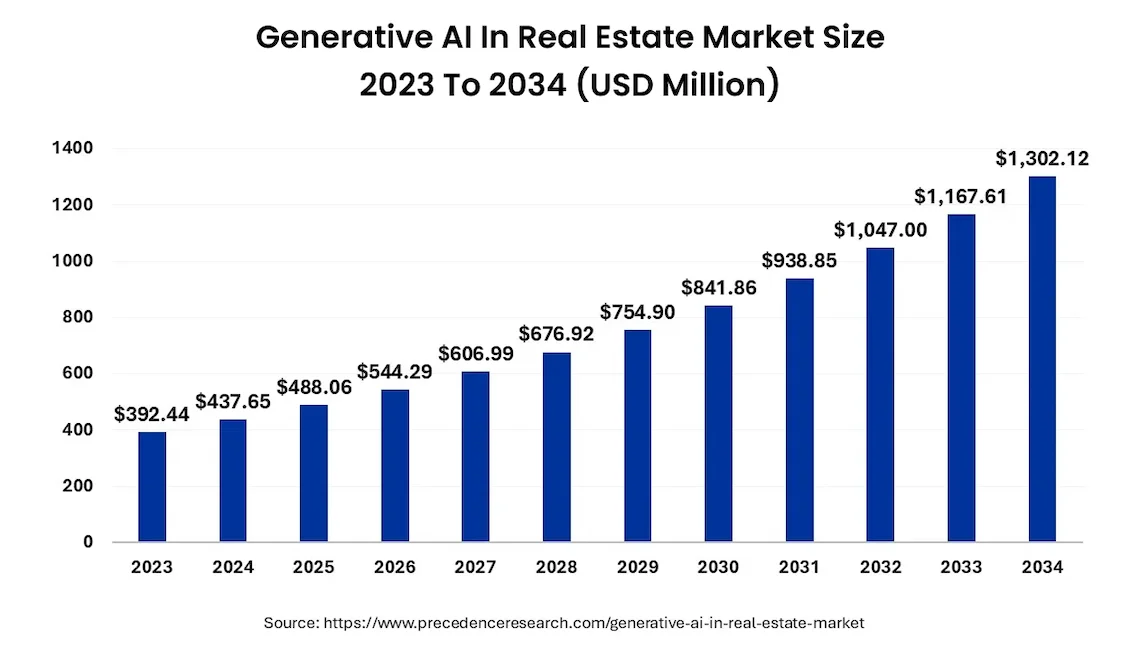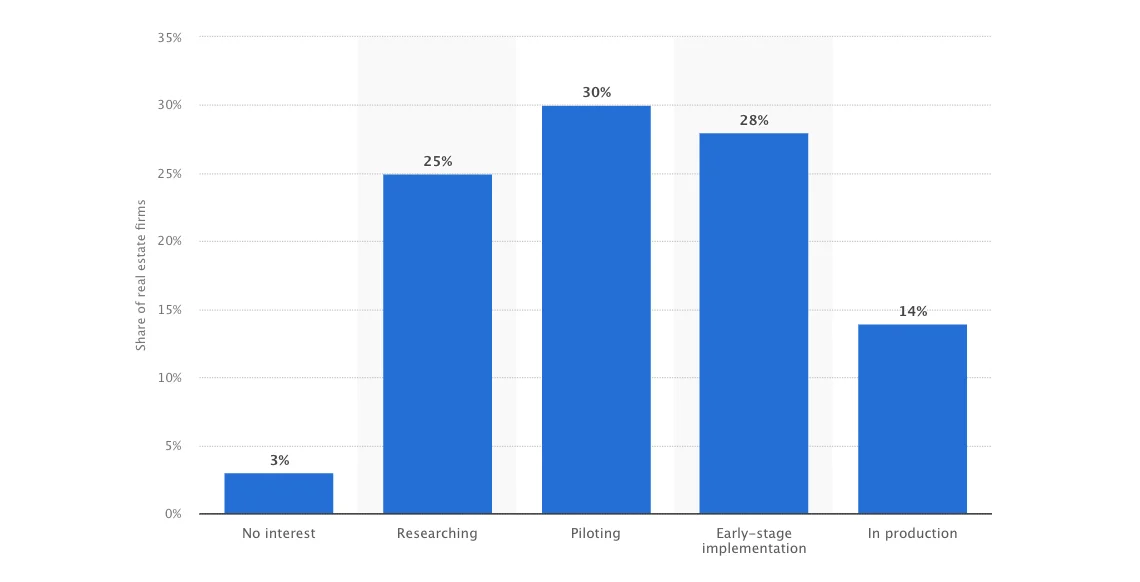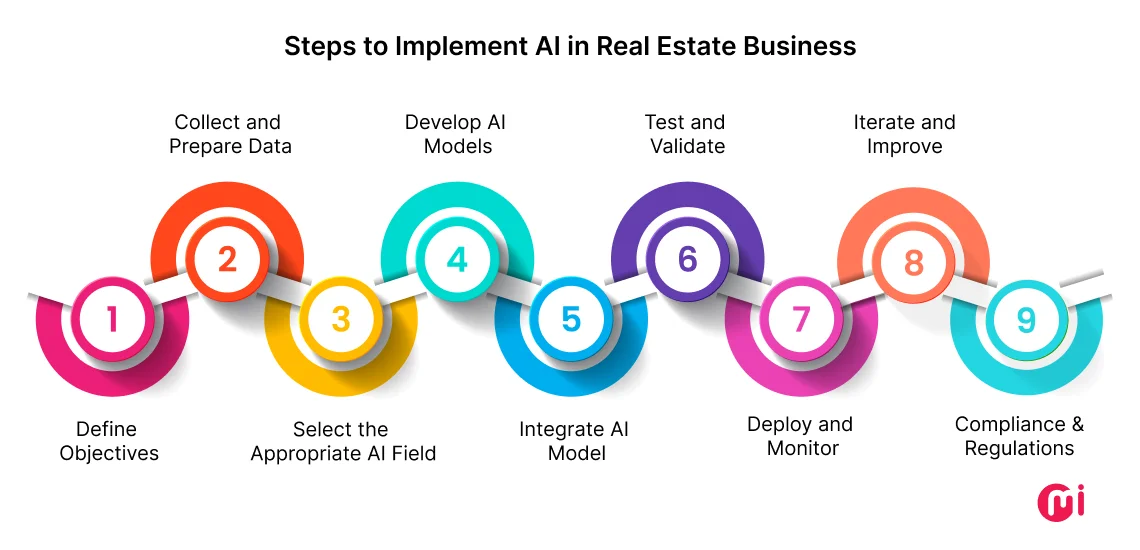AI in Real Estate: A Business Guide for Success
- AI/ML
- March 20, 2025
Do you still think the work of AI in real estate is all about streamlining processes and managing properties in a better way? Well, these are just two possibilities, and AI in real estate has more to add value to the workflows, from property evaluation to transforming the way we perceive and interact with the real estate market. This blog covers everything that interests you to revolutionize your real estate operations functions using AI, along with innovative use cases like virtual staging, smart energy management, and more, and real-world examples of Zillow, Roof AI, and more.
From automated property valuation and risk management to virtual agents that simplify communication between clients and real estate professionals, AI is revolutionizing the way the real estate industry used to operate.
There’s no doubt that AI in real estate market size is expected to reach USD 1,302.12 billion by 2034, with a CAGR of 11.52% from 2024 to 2034.

Not just that, JLL research predicts that around 90.1% of real estate firms are planning to invest in AI and other technologies supporting their human experts for various functions.
But why there’s so much hype about implementing AI in real estate processes? How other businesses in real estate are leveraging its potential to achieve cutting-edge? How do you find your opportunity to lead the real estate market through AI?
This blog has all the answers you’re looking for. So, let’s dive into the role of AI and its use cases in real estate, trends & predictions, opportunities, and challenges shaping the industry dynamic.
What is AI in Real Estate?
Artificial Intelligence (AI) in real estate refers to the use of advanced algorithms, machine learning, and data analytics to automate, enhance, and optimize various processes across the real estate industry. AI can analyze large datasets, predict market trends, streamline property management, and provide personalized experiences to buyers, sellers, and renters.
Some of the key AI applications in real estate include AI-powered property valuation tools, virtual assistants for communication, smart building management, and predictive analytics to forecast property market movements. By leveraging AI, the real estate sector can improve decision-making, enhance operational efficiency, and deliver more tailored experiences to clients.
Current Market Statistics & Scenario About the Adoption of AI in Real Estate
AI is rapidly transforming the real estate industry, offering innovative solutions that streamline processes, enhance decision-making, and improve customer experiences. Here are some of the key market dynamics:

- The AI adoption in the real estate industry is at its peak with 25% of CFOs at major companies worldwide claiming to be in the research stage, 30% in the piloting, 28% in the early-stage implementation, and 14% in the production stage.
- Not just that, PwC mentions in its research that 64% of commercial real estate investors are actually planning to increase their investment in AI-powered PropTech (Property Technology). Hence, the Proptech segment market is estimated to grow to 89.93 billion by 2032 at a CAGR of 11.9%.
- It’s also found that companies that leverage AI in real estate operations have achieved a remarkable 50% increase in lead generation and 45% in conversion rate.
- Generative AI in real estate can generate a value for the industry in the range of $110 – $180 billion.
- Real estate companies using computer vision-based property evaluation and monitoring solutions (AVM – Automated Valuation Model) have seen a 5% improvement in property valuation accuracy, leading to a 10% correction in valuations. This has resulted in approximately $57 million in increased profitability, with prices adjusted to actual property build quality, investment done, and market conditions.
- 49% of real estate businesses state that the adoption of AI has helped them cut their operating costs, while 63% report an increase in revenue.
These current market dynamics about AI adoption in the real estate industry shows the promising future of this tech in the industry. Advancements in areas like voice-activated search, neighborhood life quality analysis, proactive building health monitoring, and AI-driven natural disaster risk assessment, can be seen in action in the near future.
As the industry continues to embrace AI, we can expect to see further innovations and transformations in the way real estate businesses operate and deliver value to their clients. But what makes real estate businesses invest in AI? The next section covers the answers you need.
Benefits of AI in Real Estate Development
The use of AI in Real estate is beneficial to all these entities and types of users in various aspects. Here are some of the benefits or reasons why real estate developers must consider using artificial intelligence in their business.
- Improved property valuation
- Enhanced property search and recommendation
- Streamlined & efficient property management
- Efficient lead generation and marketing
- Personalized customer experiences
- Predictive maintenance and cost reduction
- Enhanced security
- Data-driven decision-making
- Market insights and trends analysis
- Faster transactions and property deal closures
- Sustainable and energy-efficient real estate development practices
- Enhanced tenant screening and management
- Virtual property tours and 3D visualization
- Regulatory compliance and risk mitigation
- Increased operational efficiency
- Enhanced market predictions and investment strategies
Top 8 Applications of AI in Real Estate
AI is dramatically transforming the real estate development industry through various innovative use cases that enhance efficiency, improve decision-making, and elevate customer experiences. Here are some revolutionary AI applications in real estate:
1. Automated Property Management
Automation has become a game-changer across industries, and real estate is no exception—particularly in the area of property management. From bookkeeping and call confirmation-based processes to digitizing processes for better accessibility and leveraging AI for seamless management, property management has evolved significantly.
Thanks to AI, tasks like record-keeping and reminders in property management now have become hands-free. There are 10 things that automated property management offers to business owners, along with improved efficiency, enhanced tenant experience, and streamlined operations:
- Maintenance request management
- Rent collection automation
- Lease renewal request management
- Tenant onboarding
- Seamless tenant communication
- Expense and income tracking
- Automated lease/sell document management
- Property maintenance vendor management
- Property inspection and valuation
- Comprehensive reporting and analytics
2. Intelligent Property Search
AI-powered personalized property search engines and recommendation systems are transforming the real estate industry by offering tailored property suggestions based on user preferences and behavior. These systems analyze data such as location preferences, budget, property type, and even past searches to provide highly relevant property options.
By leveraging machine learning algorithms, AI can predict user needs and refine search results, enhancing the overall user experience. Do think to hire machine learning developers who can help you build powerful algorithms for recommendation systems precisely suggesting properties meeting the preferences of the users.
This approach not only saves time but also improves customer satisfaction by delivering targeted property recommendations that match the buyer or renter’s unique requirements. Additionally, AI-driven insights help real estate businesses personalize marketing efforts, boosting lead conversions and customer engagement. This also asks to hire data scientists who can effectively meet your demands for the data models to train your search engine and recommendation system.
From permanent living to rental and vacation property listing sites, this AI-powered use case can benefit platform owners. In the vacation rental category, Airbnb leads the market with advanced filter-based search engines and personalized recommendations—one of the key reasons behind the popularity of this revolutionary Air, Bed & Breakfast booking app.
Wondering how much does it cost to build an app like Airbnb? Our linked blog is your definitive guide to creating an advanced personalized property recommendation solution.
3. Automated Property Inspections & Valuation Model
Automated Valuation Model (AVM) leverages computer vision capabilities, mathematical models, and statistical analysis to evaluate real estate properties and assess their value.
AVMs are trained on large datasets, advanced algorithms, and machine learning models to deliver fast and accurate property assessments.
One of the key advantages of AVMs is the automation of property valuation without the need for on-site inspections, making the process both cost-effective and time-efficient.
The primary goal of implementing automated property valuation solutions for real estate professionals is to price properties accurately, minimizing the risk of overpricing or underpricing.
Furthermore, this automated valuation model can be leveraged for use cases such as:
- Mortgage lending: Streamlining processes for more efficient handling, better risk management, and increased profitability in lending.
- Real estate investment portfolio management: Providing data-driven insights to enhance asset value, improve investment decision-making, assess risks more effectively, and drive strategic financial growth.
- Underwriting: Analyzing large volumes of property valuations quickly and accurately, which is particularly beneficial for lenders managing a high volume of mortgage applications.
- Due diligence: Assisting investors and lenders in making informed decisions by ensuring thorough evaluations are conducted before committing to purchases.
The use of Automated Valuation Models in real estate is transforming how property values are assessed and utilized across various applications. AVMs provide speed, accuracy, and efficiency that traditional appraisal methods often lack.
4. Intelligent Virtual Staging
Home staging in the real estate industry plays a crucial role in preparing your home to its best version through rearranging furniture, using tasteful deco, and more, in short, to make it visually appealing that interests your potential buyers. However, rearranging your home for that feel is a time-consuming and costly process.
What if we say, there’s a way to deal with that? Then, virtual staging is the answer. However, this process also requires human efforts but is a bit less costly.
So, to beat that, AI comes to the rescue and adds an intelligent touch to the real estate virtual staging process.
Here’s specific types of AI – generative AI and computer vision are used to optimize the virtual staging process. Using generative AI and computer vision in virtual staging applications, you can automate the process of transforming empty or outdated property photos into visually appealing, fully furnished images.
So, here’s how it works:
- It starts with room analysis, where AI algorithms use computer vision to analyze the room’s layout, dimensions, and lighting conditions. Based on the analysis, its ML models digitally adjust furniture and decor that match the chosen style, while ensuring realistic textures, shadows, and proportions.
- By leveraging these AI-driven techniques, real estate professionals can enhance properties with tools like virtual staging in real estate, creating stunning, buyer-ready homes that captivate buyers and accelerate sales.
The best thing about intelligent virtual staging is that it’s super fast and pocket-friendly, eliminating the need for physical staging.
Its generative AI capabilities allow you to generate multiple home staging variations with just a snap of fingers to cater to different buyer preferences and market trends.
This shows the opportunity for your real estate business to help buyers envision a property’s potential, resulting in quick sales.

5. Real Estate Portfolio Management With Risk Assessment
When investing in real estate, it’s crucial to consider several key factors to ensure a successful investment. These include location, market trends, property condition, financing options, legal considerations, investment goals, cash flow potential, risk factors, exit strategy, and thorough due diligence.
Imagine the stress a real estate investor feels when deciding on their next property investment.
Why not ease that burden by offering a platform that provides data-driven insights on listed properties, complete with profit potential and associated risks, enabling investors to make informed decisions?
Yes, that’s possible—by leveraging AI-powered real estate investment platforms! But how to use ai in real estate portfolio management?
AI can empower professionals to manage their property portfolios more efficiently by analyzing large datasets, including market trends, property performance, and economic indicators. Through predictive analytics, AI assesses risks such as fluctuating market conditions, property depreciation, or tenant defaults. This allows investors and property managers to make informed, data-driven decisions, optimizing asset value, improving risk management, and driving long-term strategic growth.
6. Smart Energy Management
As per the International Energy Agency’s report, buildings account for nearly 30% of global final energy consumption and 26% of global energy-related emissions.
However, manually looking at a building’s energy usage and avoiding overuse of energy can be a whole different tiresome task. Therefore, the requirement for integrating AI in real estate operations, specifically in energy management comes in place to achieve environmental sustainability.
You can develop an AI-powered energy management system (EMS) to continuously analyze real-time data on energy consumption to identify inefficiencies and optimize usage. You can use this platform to automate HVAC optimization and cut costs by up to 25% and decrease energy emissions by 40%.
Further, you can also use AI to monitor building systems and detect anomalies in HVAC and lighting systems to foresee potential failures and fix them before they worsen the situation. This can help to reduce equipment failures by 40% and extend asset lifespan.
Next, AI can be integrated with renewable energy sources which helps to efficiently use solar and wind energy by predicting production levels and managing storage.
7. Lease Abstraction
In real estate, a lease plays a crucial role in legally granting a tenant the right to occupy and use the property for a specific period, in exchange for rent.
This can cover many key aspects covering property use, terms of the lease, clauses for maintenance and repairs, termination, and many rules and regulations.
Manually reading the entire lease from start to end can be full of boredom for many. Because of this, many even end up signing the lease without reading the full and getting into trouble, including unexpected costs, disputes, potential eviction, or something else.
This requires a solution called Lease Abstraction that summarizes key information from the lease agreement into a standard format. This lease abstraction solution not only helps in efficient lease management but also ensures compliance with terms and accounting standards.
In this solution, AI can be integrated to swiftly process lease documents to extract key information such as lease terms, rent amounts, renewal options, and termination clauses. This significantly reduces the time and effort required, enhances accuracy and consistency, and improves compliance monitoring.
8. AI-powered Fraud Detection
There were over 9521 real estate fraud-based complaints, leading to a financial loss of $145,243,348 in total, as revealed by the 2023 FBI IC3 Report.
When we talk about real estate frauds, some of the popular ones include those related to mortgage, title (deed), foreclosure rescue, rental, wire schemes, property flipping, home equity, as well as real estate investment.
To avoid that, awareness of such real estate frauds is necessary. Along with that, how about you implement AI in your real estate solutions to detect fraud?
- You can implement AI in your system to analyze transaction patterns, identify anomalies, and flag them for further investigations.
- AI can be used for document authentication, which helps to identify alterations or forgeries in pay stubs and bank statements. This helps property managers to detect fraudulent tenant applications.
- AI can be used in property documentation analysis to monitor suspicious activities and detect unauthorized changes in property records that could indicate deed or title fraud.
In these ways, AI can help to effectively detect and prevent fraudulent activities, thereby safeguarding assets and maintaining market integrity.
9. Virtual Property Tours and 3D Modeling
Before buying any property, taking a property tour is a must. Well, paying a physical visit to the real estate property is great, but it’s also time-consuming at the same time. Many buyers don’t have the time to personally visit every property they have planned to visit. In this case, there are chances, that potential buyers may end up buying another property in their list which they marked just above yours.
You can target that missed opportunity by using AI to create virtual property tours and 3D models of it for even enhanced customer experience.
AI can help to generate detailed 3D models of properties which can allow potential buyers to explore spaces remotely with a high degree of realism. All AI needs is accurate floor plans from property scans or images.
Another plus point for investing in AI for virtual property tours is that it allows buyers to view your property from anywhere. This breaks down geographical barriers and expands the market reach for sellers. This increased accessibility can lead to a broader pool of potential buyers.
Moreover, AI-generated high-end 3D walkthroughs can even enable potential buyers to visualize different configurations and make informed decisions quickly, leading to accelerated sales processes.

Real-World Examples of AI Applications in Real Estate
Nowadays, many real estate companies are leveraging data and AI to revolutionize their workflows. The ones we are going to list below are using AI in real estate development to change the way they used to analyze the real estate market, cater to buyers, and invest.
Let’s check out top real-world AI applications in real estate development:
1. Zillow
Zillow is a known American tech real-estate marketplace company that leverages AI and ML to make property search easy at their preferred location.
It analyzes users’ behaviors and preferences to offer personalized property suggestions and enhance their search experiences.
Beyond traditional digital property search, it has also built an AI-powered feature that allows users to search properties using conversational language. This makes their search experiences even more intuitive.
Leveraging AI, it also provides detailed virtual property tours and interactive floor plans that give users a comprehensive view of properties remotely.
Moreover, it also has created an AI-powered property valuation tool called “Zestimate” that analyses property data such as sales transactions, tax assessments, and public records at scale to provide estimated market value for over 100 million homes in the US.
2. Matterport
Matterport is a leading technology company specializing in creating 3D digital twins of physical spaces, revolutionizing sectors such as real estate, architecture, and facilities management. Leveraging AI, they have created many intelligent innovations.
Cortex AI, which is a proprietary AI engine that automates the creation of 3D digital twins by processing data from various capture devices (including 3D cameras, LiDAR sensors, and mobile devices). Using all, it generates detailed and accurate virtual models without human intervention.
Property Intelligence is a suite of AI-powered features that provide automated measurements, layouts, editing, and reporting capabilities derived from Matterport digital twins.
It has also created an AI-powered virtual staging and refurnishing solution that enables users to virtually furnish and refurnish spaces within their digital twins by providing various styles and conditions based on different preferences.
Matterport’s efforts towards integrating AI for innovative real estate purposes have significantly transformed how properties are marketed, managed, and experienced.
3. Realtor.com
Realtor.com is the #1 most trusted by real estate professionals to find the right home. Amidst technology reshaping the real estate industry, they have also experimented with AI models to effectively help their home buyers find their perfect homes.
They studied that most users prefer to look at home photos when exploring spaces. In that, they identified that their users look for specific details, such as “curb appeal” or “open living and dining with a chef’s kitchen.”
Looking at that, Realtor.com integrated AI to categorize property images based on room type and aesthetic, enabling users to find properties with similar “look-and-feel” characteristics. They named this feature “Homes with Similar Rooms.”
To create room-to-room visual comparisons, they used OpenAI’s CLIP (Contrastive Language-Image Pre-training) model, which has become popular because of its Zero-Shot Classification excellence.
With this, they not only enabled finding similar image-based results but also created a feature that allowed users to input textual descriptions of their ideal homes, and then it would generate images and search for real listings matching that.
They further leveraged generative AI capabilities to enable homeowners to visualize realistic design customizations for their properties by uploading photos and specifying desired changes.
As the latest, they have developed an AI-powered image tagging service that automatically generates descriptive tags for real estate images for accurate and efficient property listing.
4. Roof AI
Roof AI is a suite of AI-powered sales assistants that’s on a mission to assist real estate agents to achieve better outputs. The suite consists of assistance for brokerage, mortgage, client relocation, and lead generation.
Its solutions are designed to provide consistent and personalized experiences across various communication channels. This approach ensures that clients receive seamless support regardless of the platform they choose to use.
By integrating these AI-driven features, Roof AI aims to streamline real estate workflows, enhance client engagement, and ultimately drive higher conversion rates for real estate businesses.
5. HouseCanary
HouseCanary is the most trusted and reliable AI-powered data & analytics platform that offers valuation-focused real estate brokerage solutions. Be it financial institutions, investors, lenders, mortgage investors, or consumers, this solution offers tools for industry-leading valuations, forecasts, and transactions.
It has launched Canary AI, an AI-powered real estate assistant that allows users to interact conversationally to obtain instant insights on properties, valuations, and market trends.
This platform also encompasses AVM (Automated Valuation Models) that analyses extensive datasets, including historical pricing and market conditions to deliver precise property valuation.
Moreover, HouseCanary has leveraged AI to implement predictive analytics on home price movements, which enables users to anticipate market trends and make informed investment decisions.
HouseCanary has a dataset of 136M+ of national properties, has a 3.1% median absolute percentage error on valuations, and a 1.7% median absolute HPI 12-month forecast error.
How to Implement AI in Real Estate Software Solutions?
To seamlessly implement AI-powered real estate development solutions, careful consideration, and execution of several key steps are essential, including the decision to hire AI developers. Ensuring that each step is carried out effectively, will lead to a successful implementation and maximize the benefits of AI in enhancing your real estate operations.

STEP 1: Identify Pain Points and Define Opportunities
Identify the specific problems or opportunities where AI can add value, such as property valuation, lead generation, or customer service.
STEP 2: Collect and Prepare Data
Gather relevant data from various sources, including property listings, market trends, and user interactions. Clean and preprocess the data to ensure quality and consistency.
STEP 3: Select the Appropriate AI Field
Choose appropriate AI fields and algorithms based on your objectives. This may include machine learning for predictive analytics, natural language processing for chatbots, computer vision for property image analysis, and more.
STEP 4: Develop AI Models
Build and train AI models using the prepared data. This involves selecting algorithms, training models, and fine-tuning them to ensure accuracy and relevance.
STEP 5: Integrate AI Model With Your Existing Real Estate Software
Incorporate the AI models into your existing real estate software infrastructure. Ensure seamless integration with other systems such as MLS, GIS, Property Management, Portfolio Management, Inventory Management, and more.
STEP 6: Test Your AI-powered Real Estate Solution
Conduct thorough testing to identify AI solution performance bottlenecks. Check for accuracy, reliability, and user satisfaction. Make necessary adjustments based on feedback.
STEP 7: Deploy and Monitor
Deploy the AI-enhanced software in a live environment. Continuously monitor its performance and gather user feedback to identify areas for improvement.
STEP 8: Identify Performance Gaps and Improve
Regularly update and refine AI models based on new data and changing market conditions. Stay informed about advancements in AI to incorporate new features and capabilities.
STEP 9: Ensure Compliance With Real Estate Industry Regulations
Adhere to data privacy regulations and industry standards to ensure that the use of AI in your software complies with legal and ethical guidelines.
Potential Challenges In Implementing AI in Real Estate and Their Effective Solutions
Overcoming the challenges of integrating AI into your real estate business requires a strategic approach and practical solutions. Let’s check out the most common challenges you can face when implementing AI in real estate solutions to resolve key issues:
1. Data-Related Challenges
The real estate industry majorly deals with fragmented (siloed), inconsistent, and outdated data as they’re gathered from various sources, such as property listings, public records, and market trends. Because of this, there might be data integration challenges.
Moreover, real estate businesses may have many historical biases (e.g., discriminatory lending practices). If these data feed to AI models to train on, they can lead AI systems to amplify biases, leading to unfair outcomes. A great example to understand this bias is an AI-powered property valuation tool undervaluing properties in certain neighborhoods.
Solutions:
- Implement a data pipeline to streamline data gathering, then send it for ETL processing to clean, standardize, and validate data.
- Augment existing data with external sources to improve completeness and accuracy and even deal with biases.
2. Technological and Integration Challenges
Though AI has been here for a long time, it’s still a tech that requires specialized knowledge and skills. Real estate professionals may lack the necessary expertise to make the most of AI tech. Not to forget, implementing AI initially requires for significant high investment.
Not just that, integrating AI into existing real estate software like CRM, property management systems, and others, is a complex process. This process asks for significant efforts to ensure interoperability and smooth data exchange.
Solutions:
- To deal with high initial AI implementation costs, you can opt for cloud-based solutions, leverage SaaS AI tools, and follow phased implementation.
- To deal with specialized AI skill shortages in your organization, you can either train your existing team (which can take months or even years) or hire dedicated AI developers ready to execute your plan from day one of onboarding.
- To solve integration challenges, you can prioritize an API-first approach, opt for middleware solutions, implement custom connectors, and even utilize data mapping and transformation rules.
3. Resistance to Change
The real estate industry is more focused on building infrastructures that become attraction for their target audience than adopting digital tech. And it has always been like that.
Not just the lack of understanding of the latest technology adoption but also their comfort with existing real estate business management processes is strangling them from embracing the tech innovation. This can become a roadblock for real estate businesses to integrate AI into their day-to-day back-office operations.
Solutions:
- First, clarify how AI can benefit their workforce through process automation and free up their time for strategic activities.
- Involve employees in the AI implementation process to know their feedback and concerns.
4. Legal and Regulatory Challenges
The legal and regulatory standards related to AI and data privacy are evolving with this trend. This asks for real estate businesses to stay updated with the new rules and compliance requirements.
For implementing AI in real estate business processes, there might be challenges in terms of maintaining algorithmic transparency, biased outcomes, and more.
Solutions:
- You can ensure to implementation AI-powered continuous monitoring solution to identify changes
- Implement proactive measures to ensure compliance with current and anticipated regulations
- Implement explainable AI techniques supporting transparency.
- Implement AI models that are interpretable.
- Enforce human oversight in critical decision-making processes to ensure accountability.
What’s the Future of AI in Real Estate?
To keep up with the pace of AI adaptation in the real estate industry, it becomes inevitable to foresee AI trends for the future. Here are some of the trendy AI applications in real estate to watch out for if you’re wondering about the the future of AI in real estate:
1. Advanced Analytics
When it comes to analyzing silos of data, the human mind has a limitation which is why this real estate AI trend can open the unexplored doors of data analysis that were beyond human capabilities due to manual analysis limitations.
A lot goes into a real estate marketer/agent trying to sell the property to tenants/investors hunting for the best deals. These advanced analytics are a win-win for both entities.
AI in real estate solutions can be used in the various form of advanced analytics for:
- Neighborhood life quality analysis
- Predictive property value trends
- Tenant screening and behavior analysis
- Predictive analytics for property investment
Further, with the use of AI in real estate industry, these professionals can analyze vast datasets and historical trends to forecast property performance, have perfect market timing, make an efficient capital allocation, smartly diversify portfolios, and more.
2. Legal and Regulatory Compliance
It is not just the tax, mortgages, and insurance that are to be taken care of when one buys, sells, or rents a property. Real estate professionals must consider various legal factors, including safety and health standards, zoning laws, contractual obligations, and local, state, and federal regulations.
A breach in any of these aspects can land the real estate professional or firm in legal troubles like fines, lawsuits, and more.
The use of Artificial Intelligence in real estate especially for ensuring the law and regulatory compliance would help the professional scan for any loophole in legal documents, identify legal/regulatory risks associated with any property development, empower automatic generation of compliance reports, ensure data accuracy in reports, and facilitate real-time monitoring of regulatory changes.
3. Building Health Monitoring
From security and safety to indoor air quality, fire and smoke detection, elevator and escalator monitoring, water leak detection, compliance and reporting, and more, the use of AI in real estate can facilitate the timely and accurate monitoring of property’s overall health.
AI can analyze the data from various sensors and systems present in the property to monitor equipment and systems, such as HVAC, plumbing, and electrical systems, and to anomalies or signs of wear and tear.
The job of AI does not just end at detection as its most important role comes into play with its prediction capabilities to prevent any costly breakdowns or increase in downtimes.
4. AI-Predicted Urban Planning
Urban planning encompasses various characteristics and principles that guide the development and management of urban areas for spatial organization, infrastructure development, aesthetics and design, transportation, security, economic development, resilience and disaster preparedness, and more.
AI algorithms will analyze vast datasets, including demographics, traffic patterns, environmental factors, and social trends, to inform city planning decisions. Whether it is to predict and mitigate traffic congestion, planning of green spaces, renewable energy integration, optimizing public transportation routes, generating design options that maximize space utilization and energy efficiency, and more.
AI-predicted urban planning promises to create more efficient, sustainable, and livable cities, improving the quality of life for urban dwellers while addressing pressing planning challenges.
5. AI Real Estate Advisors
From financial guidance, investment strategies, legal and regulatory expertise, property search/selection/management, and more, real estate advisors have a key role to play. The effectiveness of this multifaceted role can be increased by AI real estate advisors which are just computer-based systems and real estate applications but come with capabilities of data analysis, machine learning, and predictive modeling to offer insights and more.
This AI for real estate agents can not only analyze the market better but also provide data analysis, machine learning, and predictive modeling to offer insights, evaluate investment risks, offer 24/7 customer support through chatbots and virtual assistants, analyze historical data and market dynamics, and even identify profitable ventures.
In a nutshell, these AI real estate advisors are anticipated to empower clients with data-driven insights, ultimately leading to more informed and successful real estate transactions.

Develop Custom AI-powered Real Estate Solutions with MindInventory
As AI continues to transform various industries, its future holds even greater potential for real estate. To thrive in this evolving landscape, real estate businesses must invest in AI development as a key strategy moving forward.
This is where MindInventory stands out as a preferred AI development company, trusted by leading brands like Passio.AI, ChipBrain, and I.AM+, for revolutionary AI solutions.
Our team of data and AI/ML experts will empower your real estate business with a custom AI-driven software solution, giving you a competitive edge and unlocking the full potential of this rapidly growing technology to drive unprecedented business growth.
Being one of the renowned companies offering real estate software development services, MindInventory offers flexible engagement service models like on-time delivery, flexible engagement models, and time zone alignment.
So, have a project for us? Contact us today with your AI-powered real estate software development requirements!
FAQs on AI in Real Estate
AI is used in real estate for predictive analytics, property valuation, market trend analysis, personalized property recommendations, and automating administrative tasks.
Implementing AI in real estate solutions can cost anywhere from $20,000 to $200,000 and more. However, the cost for it may vary depending on several factors, including the complexity of the technology, AI tool subscription prices, specific use cases, and the scale of deployment.
You can leverage generative AI to automate property descriptions, create personalized property listings, optimize property designs, enhance property visualization in virtual staging, generate targeted and personalized marketing content, and enhance virtual property tours.
When implementing AI in real estate development projects, you may face challenges including data quality and integration issues, high initial costs, resistance to change, and lack of specialized skills in your team to manage AI technologies.
Popular examples of AI in the real estate industry include REimagineHome – a generative AI-powered real estate staging platform, Zillow – an AI-powered property valuation tool, Redfin – An advanced property search engine, Reonomy – CRE property and ownership intelligence, and more.
AI will enhance decision-making, streamline operations, improve customer experiences, and provide deeper market insights, leading to more efficient and targeted real estate practices.
Yes, AI can generate real estate leads by analyzing market data, identifying potential buyers or sellers, and creating targeted marketing campaigns to attract and engage prospects.
You can use agentic AI in real estate to revolutionize property search and buying experiences, market analysis and predictive investments, property valuation and asset optimization, mortgage and financing, property management and tenant experience, legal and documentation automation, real estate marketing, and urban planning.













